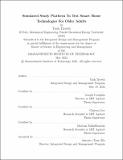Simulated Study Platform To Test Smart Home Technologies For Older Adults
Author(s)
Trivedi, Yash
DownloadThesis PDF (7.445Mb)
Advisor
Coughlin, Joseph
Lee, Chaiwoo
FakhrHosseini, Maryam
Terms of use
Metadata
Show full item recordAbstract
The current global population is undergoing an unprecedented demographic change with a rapid increase of older age groups. One of the greatest challenges facing our aging population is the need to age independently, preferably at home. Smart home technologies such as connected lighting, security systems and sensors have been suggested to provide older adults with better health, safety and peace of mind. While these smart home technologies promise great benefits, their adoption is low among older adults, and identifying the potential barriers remains an open question among academia and industry. However, these research efforts lack a framework to test and identify these human factors, and potential barriers in a scalable and low cost manner.
This thesis explores the possibility of using a simulated smart home experience designed to demonstrate technology integration in a typical daily routine of an older adult to observe and test their interactions with various smart home technologies. The overall objective of this thesis is to design a simulated smart home experience based on a framework describing different levels of home automation, followed by a user study to observe and evaluate older adults’ interactions with technologies in the domains of energy management, health and wellness, housework support, and safety \& security. The outcome of this study is a framework to test various smart home technologies in a simulated smart home environment validated with a study conducted to simulate a traditional home (L1) and a networked home (L3) to derive insights and design considerations to increase the adoption of smart home technologies among older adults.
Date issued
2022-05Department
System Design and Management Program.Publisher
Massachusetts Institute of Technology